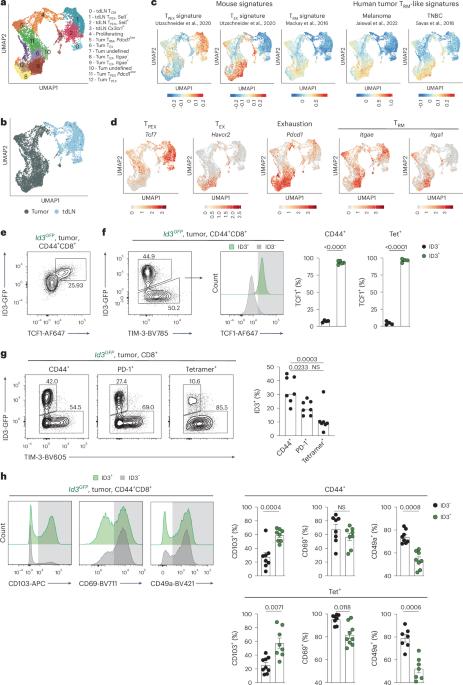Lymph-node-derived stem-like but not tumor-tissue-resident CD8+ T cells fuel anticancer immunity
IF 27.6
1区 医学
Q1 IMMUNOLOGY
引用次数: 0
Abstract
CD8+ T cell-mediated tumor control and efficacy of immune checkpoint blockade (ICB) are associated with both precursors of exhausted T (TPEX) cells and tissue-resident memory T cells. Their relationships and relative contribution to tumor control, however, are insufficiently understood. Using single-cell RNA sequencing and genetic mouse models, we systematically dissected the heterogeneity and function of cytotoxic T cells in tumors and tumor-draining lymph nodes (tdLNs). We found that intratumoral TCF1+ TPEX cells and their progeny acquired a tissue-residency program that limits their contribution to tumor control and ICB response. By contrast, MYB-dependent stem-like TPEX cells residing in tdLNs sustained CD8+ T cell infiltration into tumors and mediated ICB response. The cytokine TGFβ was the central factor that enforced residency of intratumoral CD8+ T cells and limited the abundance of stem-like TPEX cells in tdLNs, thereby restraining tumor control. A similar network of TGFβ-constrained intratumoral and extratumoral CD8+ T cells with precursor and residency characteristics was found in human cancer. Here the authors dissect the developmental and functional relationship between tumor-responsive cytotoxic T cells in the tumor versus the tumor-draining lymph nodes (tdLNs), finding that stem-like TPEX cells dependent on MYB in the tdLNs are required for CD8⁺ T cell tumor infiltration and ICB responses.


淋巴结衍生的干细胞样而非肿瘤组织驻留的CD8+ T细胞可促进抗癌免疫
CD8+ T细胞介导的肿瘤控制和免疫检查点阻断(ICB)的有效性与耗竭T细胞(TPEX)前体和组织驻留记忆T细胞有关。然而,它们之间的关系和对肿瘤控制的相对贡献还不够清楚。利用单细胞RNA测序和遗传小鼠模型,我们系统地解剖了肿瘤和肿瘤引流淋巴结(tdln)中细胞毒性T细胞的异质性和功能。我们发现肿瘤内TCF1+ TPEX细胞及其后代获得了组织驻留程序,限制了它们对肿瘤控制和ICB反应的贡献。相比之下,居住在tdLNs中的myb依赖性干细胞样TPEX细胞持续CD8+ T细胞浸润到肿瘤中并介导ICB反应。细胞因子TGFβ是强制肿瘤内CD8+ T细胞驻留并限制tdLNs中干细胞样TPEX细胞丰度的核心因素,从而抑制肿瘤控制。在人类癌症中发现了类似的具有前体和驻留特征的tgf β抑制瘤内和瘤外CD8+ T细胞网络。
本文章由计算机程序翻译,如有差异,请以英文原文为准。
求助全文
约1分钟内获得全文
求助全文
来源期刊

Nature Immunology
医学-免疫学
CiteScore
40.00
自引率
2.30%
发文量
248
审稿时长
4-8 weeks
期刊介绍:
Nature Immunology is a monthly journal that publishes the highest quality research in all areas of immunology. The editorial decisions are made by a team of full-time professional editors. The journal prioritizes work that provides translational and/or fundamental insight into the workings of the immune system. It covers a wide range of topics including innate immunity and inflammation, development, immune receptors, signaling and apoptosis, antigen presentation, gene regulation and recombination, cellular and systemic immunity, vaccines, immune tolerance, autoimmunity, tumor immunology, and microbial immunopathology. In addition to publishing significant original research, Nature Immunology also includes comments, News and Views, research highlights, matters arising from readers, and reviews of the literature. The journal serves as a major conduit of top-quality information for the immunology community.
 求助内容:
求助内容: 应助结果提醒方式:
应助结果提醒方式:


